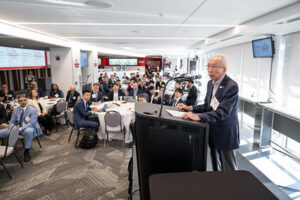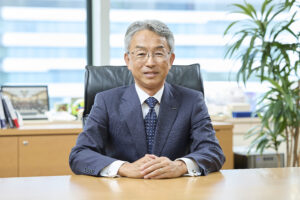70th MUMEI-JUKU(28/10/2024)
Theme:Trends in Discussions on AI and Legal Regulations
Guest Speaker: Mr. Jun Okada (Partner, Mori Hamada & Matsumoto)
♦Opening Remarks by Dr. Takeda♦
Last December 28, Time Magazine published an article titled “2024 is ‘The Year of Elections. In fact, in “The Ultimate Election Year: All the Elections Around the World in 2024,” the magazine stated that the year 2024 will be a major turning point, as elections will be held in 64 countries around the world in 2024, with about half of the world’s population, 49%, participating The article stated that the year 2024 will be a turning point.
In fact, the launch of the Mumeijuku study group had its origins in the question of how to deal with the aftereffects of the 2009 general election for the House of Representatives. At that time, the DPJ won 331 seats in the House of Representatives, while the LDP held only 115 seats. Then Administration then shifted to the Democratic Party. A year later, many people began to voice their concerns about the future of Japan if things continued as they were. After consulting with several people in industry and academia, the Mumeijuku was launched in 2010 as a place to think about the future of Japan. Since then, the study group has been held for 14 years, and this year marks its 70th meeting. However, in light of the results of the recent election, we feel that it is necessary to continue this meeting for some time yet.
There is an important issue currently going on in Japan. This is precisely the theme of today’s session, “AI and Legal Regulations. This is a major global issue, and today’s lecturer, Atsushi Okada, will talk about the key points. Mr. Okada is a member of the “AI Strategy Council” of the Cabinet Office and the “AI Business Operator Guidelines Working Group” of the Ministry of Economy, Trade and Industry, and will continue to advise us on various aspects of comprehensive AI issues.
In the United States, President Biden issued an Executive Order on AI last October. This announcement contained three points related to the prosperity and security of the United States; (1) Developing safe and reliable AI
(2) How AI technology is leveraged to achieve national security
(3) How to promote AI governance.
These discussions have been held in the U.S. since then, and President Biden issued a memorandum (National Security Memorandum on AI) in October of this year on how to aply AI to the intelligence industry or the military.
So will these be the focus of future discussions?
On November 5, former President Trump defeated Democratic Vice President Harris for reelection in the U.S. presidential and Senate-House of Representatives congressional elections, the last of the “election year”. He has already stated clearly that he will not follow Biden’s memorandum and will get rid of it, which may change the direction of the debate in the US. The same is true in the EU, where the recent elections may change some things in the future.
The point I would like to discuss today is what legal form should be established in dealing with a technology like AI, which is rapidly accelerating in its rate of development.
What is needed legally to allow AI to grow and flourish rapidly, and how can we eliminate the digital deficit, which has become a major problem in Japan, and these issues may lead to a legal regime. Furthermore, in considering these issues, it is important to base discussions on facts. To this end, I believe that researchers, companies, and government officials need to play a role in exchanging opinions and showing that “these are the facts.
When times change rapidly, researchers are required to be able to create policies that respond to the changing times. Until now, there has been a strong sense that “researchers are only for research,” but when it is necessary to discuss required legislation and create policies one after another, researchers must be able to respond to rapid changes. I also believe that Japan, the U.S., and the EU will work together to increase competitiveness in the field of AI, and that a time will come in 10 to 20 years when China will face this side of the world.
I hope that Mr. Okada will lead discussions in the field of AI in Japan, including with politicians, in the future.


